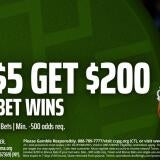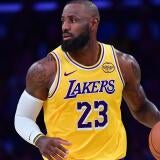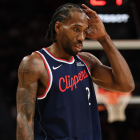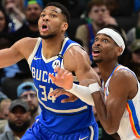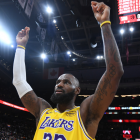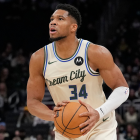Anthony Davis trade rumors: Ranking every NBA team as a possible landing spot for Mavericks' star big man
Dallas needs to trade Davis to facilitate its post-Nico Harrison rebuild, but the fit is tough
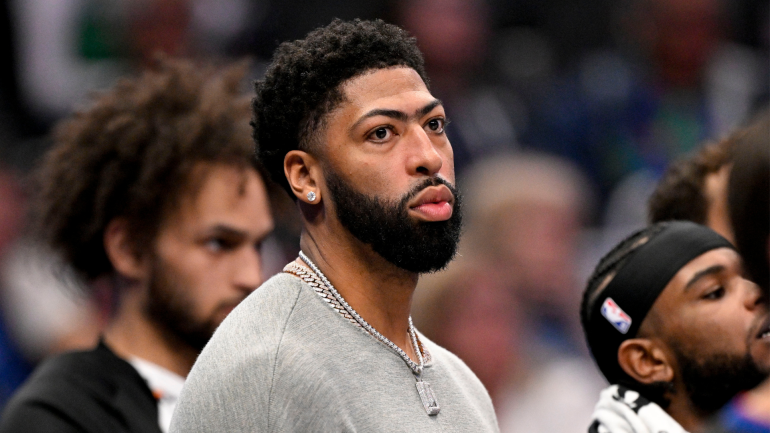
The first time Anthony Davis was traded, he netted a haul. Predictably so. He was a 26-year-old All-NBA big man with an immediate skill set that slid easily into the league's stylistic preferences at the time and upside to get substantially better. Everyone in the league wanted him, so he picked a destination and returned almost everything that team had.
The second time Anthony Davis was traded, he somehow netted even more. It didn't matter that he was six years older or that he'd dealt with meaningful injuries or that he never quite developed the 3-point shot teams once hoped he would. One specific team was fixated on trading for him and only him, and when surprisingly large trade returns happen, this is usually why. Desmond Bane wasn't worth four first-round picks in a vacuum. Mikal Bridges wasn't worth five. But it doesn't matter what 28 other teams will pay for a player, only what the highest bidder will. Nico Harrison was the highest bidder and he wasn't a rational one.
Now the irrational Harrison is gone and the Dallas Mavericks will presumably operate rationally from this point forward. If that's the case, it won't be long until we have a third Anthony Davis trade. He's simply their best hope of recouping the draft capital Harrison previously traded away. A team built around an 18-year-old has no real reason to hang onto a 32-year-old who wants to play his younger teammate's best position. The Mavericks don't control their own first-round picks between 2027 and 2030. That makes a proper 2026 tank critical. Getting Davis off of the team now, while he's still reasonably valuable, not only helps that tank but it ensures that he's gone before any further injuries or decline weakens the return he can generate.
Of course, that return is already going to be somewhat underwhelming. This is not going to be anything like the first Davis trade. He's 32, injury-prone, can't shoot 3s, wants to play the wrong position and was playing some of the worst basketball of his career before he got hurt. He's no longer a no-brainer trade candidate.
But it is feasible that the trade looks at least somewhat like the second one. No, he's not netting Luka Dončić this time or anyone like him, but for all of the reasonable concerns possible trade partners might have, he's still Anthony Davis. Before he got traded to Dallas last season, he was averaging 26 points and 12 rebounds. He was still among the best five or 10 defensive players in the NBA and can fit into any scheme. He's had a million minor injuries, but thankfully none that should be career-altering. He's never torn an Achilles or an ACL. He's by and large been a spectacular playoff performer.
It's possible that some team is going to look at him the way that the Mavericks did last February: as the missing piece in their championship puzzle or, at the very least, the star they can acquire at a reasonable price who takes them up a notch or two. That is the sort of team Davis should hope lands him. Remember, he's extension-eligible this offseason. Most teams are probably terrified of paying someone with his age and injury history. The right team would take that risk.
So that's who we're looking for. Below, we're going to rank all 29 teams in the NBA besides the Mavericks as possible Davis trade destinations. The idea here is to rule out teams that are unlikely to mount a serious pursuit and figure out which teams ultimately will. In truth, there's no single, obvious partner here. Even the teams at the top of this list should and likely do have serious reservations. But the higher we go, the likelier we are to find a team that believes the rewards of trading for Davis outweigh the risks. In the next few months, Davis is probably playing for someone in the top half of this list.
Tier XV: Functionally impossible
We've covered this where LeBron James is concerned, but it's true for Davis as well. Cleveland functionally can't trade for a player this expensive. The Cavs can't aggregate salaries because they're over the second apron and they don't have a single player earning more than Davis. That means the only way for Cleveland to make a legal Davis trade would be getting below the second apron within that trade. The Cavaliers are $22 million above the second apron, so there's really not much that can be done here. Cleveland didn't need Davis anyway, so no harm, no foul.
Tier XIV: Makes no sense on our timeline
28. Utah Jazz
27. Washington Wizards
26. Brooklyn Nets
No need to spend much time here. On this level, we have three tankers that all already have young or prime centers in place. Maybe the Nets could swipe him if the price gets low enough with the idea that they'd quickly turn around and get a second star with the remainder of their assets, but we're stretching at that point. These teams are out.
Tier XIII: Just doesn't fit our salary structure
25. Denver Nuggets
24. Orlando Magic
Denver could build a trade around Jamal Murray's salary, but even he makes $10 million less than Davis does, and the Nuggets have no guard creation after him, so that wouldn't make sense. They could combine Aaron Gordon, Cam Johnson and some smaller salaries, but frankly, Gordon gives them everything they'd want out of Davis anyway. Orlando has preferred a center-by-committee approach. The Magic pay Wendell Carter Jr., Goga Bitadze, Moe Wagner and Jonathan Isaac relatively little and rotate between them. They just gave away most of their picks for Desmond Bane. They'll have four huge salaries when Paolo Banchero's max deal kicks in next year (Banchero, Bane, Franz Wagner and Jalen Suggs). Considering how much of a shooting issue they already have, turning any of those four expensive younger players into an expensive older player wouldn't really accomplish much.
Tier XII: We don't have enough to trade
23. Phoenix Suns
Phoenix's offer here would probably just be something like the package it got back for Kevin Durant, but how appealing is that, really with no first-round picks to add? The Suns had to take back Jalen Green as matching salary in that deal, but there didn't appear to be much league-wide interest in his services as part of a three-way swap when those talks happened. Khaman Maluach hasn't shown anything yet and even if he had, why would Dallas want him when it has Dereck Lively? Dillon Brooks is a nice 3-and-D role player. That's not getting Anthony Davis. So it's an interesting concept. Devin Booker and Davis would be a pretty strong duo for the Suns. The cupboard here is just so bare that constructing a deal feels nearly impossible.
Tier XI: We have Anthony Davis at home
22. Oklahoma City Thunder
21. San Antonio Spurs
20. Memphis Grizzlies
Could Davis play with Chet Holmgren, Victor Wembanyama or Jaren Jackson Jr.? Sure. But when you already have an elite rim-protector -- and yours is younger and can shoot 3s -- there's just not a good reason to trade for another one if he's making max money. The Thunder get everything they need out of a second big man with Isaiah Hartenstein, who costs half as much and was signed outright in free agency rather than acquired by spending assets in a trade. San Antonio is paying Luke Kornet 20% of what Davis makes. He's much more than 20% of the player Davis is. The Grizzlies have a million other big men. They're just all hurt. They're not punting on Zach Edey, Brandon Clarke and Santi Aldama to get Davis when they're 4-8 and dealing with their own injury-prone star who can't shoot 3s in Ja Morant. When you already have a Davis-esque player, you need a really good reason to pursue Davis himself. None of these teams have one.
Tier X: We prefer our young guys
19. Houston Rockets
18. Miami Heat
17. Detroit Pistons
16. Portland Trail Blazers
It feels a bit unfair to even refer to Alperen Sengun as a young player anymore. He's just an All-Star now. If the Mavericks asked them for him in a Davis trade, the Rockets would laugh them off the line. They could play together on certain teams, but not one that also relies on Amen Thompson and several other shaky shooters. Besides, why does Houston even need another high-level big? The Rockets already have the NBA's best rebounding rate by far, they score the seventh-most points in the paint per game in the league and they allow the seventh fewest. They're happy with what they have.
Miami, Detroit and Portland are a bit more interesting. In certain contexts, all three could pursue a star in the near future. Davis just isn't the one for them. The Heat refused to trade Kel'El Ware for Kevin Durant and he's rewarded them by taking a step forward in Year 2. They're not breaking up his partnership with Bam Adebayo. Jalen Duren is having a breakout season and Isaiah Stewart is one of the NBA's best rim-protectors. If they trade for a bigger player, it will be someone like Lauri Markkanen who can shoot. The same is probably true for Portland. Donovan Clingan has impressed in his second season, Toumani Camara is another great defender who can't shoot, and all three of these teams are already winning. This isn't the trade for them.
Tier IX: Is this really where we should fire our last bullet?
15. Milwaukee Bucks
14. Los Angeles Clippers
We've reached the point on the list where teams could theoretically have both the interest and the ammunition to make a trade. It's a question of motivation. The Bucks currently have one tradable first-round pick, either their 2031 or 2032 selection. The Clippers have two, their picks in 2030 and 2032 (though both are at some degree of risk given the Kawhi Leonard investigation). In other words, these teams have one significant move apiece to make this season and probably for the next few. Is Davis really the player to fire those bullets for?
In Milwaukee's case, the answer is almost certainly no. They just added Myles Turner and they're playing very well. If they're making a big upgrade, it's likely either a wing defender or a more proven guard than anyone in their current, younger group. They're very motivated to win now with an extension decision looming in the offseason for Giannis Antetokounmpo, but Davis just isn't the piece they need.
The Clippers could perhaps justify it depending on how the next few weeks and months go. They have relatively smooth matching salary in John Collins, Bogdan Bogdanović and some of their bench pieces, and if Dallas could get two unprotected Clipper picks, that would be a pretty substantial win. Could Davis and Ivica Zubac play together? Maybe with enough shooting elsewhere, which is a tough ask here given how many defensive-minded wings this team has. It's suboptimal, but ultimately likely viable. Still, the Clippers are 3-7. Reporting has suggested that whether or not Leonard's investigation leads to a substantial punishment, he's on the way out. The Clippers are likely thinking more about their next team than this one. They should hold those picks to build for the post-Leonard era, not push more chips into the present.
Tier VIII: Interested but doesn't fit our salary structure
13. Boston Celtics
Davis would probably be more amenable to Boston this time than he was in 2019. It's a contender (albeit in a gap year) with a gaping hole at center. It's just not realistic from a salary perspective. The Celtics probably wouldn't want to match money with Jaylen Brown. He's younger, a Celtics lifer and is playing very well this season. But if they went the other way and did so with Derrick White and Anfernee Simons, they'd be setting themselves up for a future with three players on supermax contracts. That just doesn't seem feasible in the second apron era, especially when one of them is injury prone and another is coming off of a torn Achilles. So there's some inevitable temptation because, hey, pairing Davis, Brown and Jayson Tatum would be a killer start to a team. But they just couldn't make the rest of the roster functional with so much money tied into three players.
Tier VII: … Why not?
12. Toronto Raptors
Does it really make sense for anyone involved here? No. The Raptors are already paying the luxury tax for a .500 team. It's hard to imagine them contending with Davis or paying him long-term with all of the existing money on their books. Dallas probably wouldn't be thrilled with the matching salary Toronto has to send back either. But the Raptors have all of their picks to trade and they're not really accomplishing much as is. Getting Davis is at least a direction, though not an especially inspired one.
Tier VI: Okay, we've quirked an eyebrow
11. Charlotte Hornets
10. New Orleans Pelicans
The Hornets very clearly are not a win-now team, but if the price is low enough, there's a lot to like. The Hornets badly need some measure of veteran guidance here and doing so at a position of need could go a long way. Davis would be a perfect pick-and-roll partner for LaMelo Ball. He could get the Hornets at least into Play-In range and help set a winning culture. You can't tank forever. Say the cost here is something like Miles Bridges, Collin Sexton, a younger player and a top-four protected first-round pick. That's not a crazy jump start for Charlotte and the Hornets have so little long-term money on the books that extending Davis would be doable.
Look, the Pelicans aren't the reunion you're here to read about (we'll get to them shortly). But it's not quite as crazy as it sounds. Zion Williamson and Derik Queen can't play together. They overlap too much. But Davis? He can protect Queen defensively and they're both skilled enough to make it work on offense. Williamson's non-guaranteed contract would obviously appeal to the Mavericks, perhaps enough so to swap Klay Thompson's bad contract for Dejounte Murray's, which they're likelier to get some use out of once he returns from a torn Achilles considering their need for ball-handling. Would I advise New Orleans to trade for a 32 year old? No. But the Pelicans clearly don't want to tank or else they would've kept their unprotected 2026 pick. If Queen and Jeremiah Fears grow quickly, pairing them with Davis, Trey Murphy and Herb Jones in a starting five would at least be reasonably competitive next year. If Dallas can walk away from this deal with an unprotected future Pelicans pick as the Hawks did? That's a major win.
Tier V: Here for the lulz
If the Mavericks called and offered Davis for Austin Reaves and matching salary, I suspect the Lakers would say no. Reaves is six years younger, substantially healthier and has played far better thus far this season. Now, 30 points and nine assists per game probably isn't sustainable for Reaves, but if he's averaging 25 and seven in two months, he's going to be an All-Star. No team would give away a 27-year-old All-Star for Davis right now. The Mavericks got into this mess because they traded a 25-year-old All-Star for him in the first place.
So let's say Reaves is out. Could the Lakers offer their unprotected 2031 first-round pick, their four available swaps (2026, 2028, 2030 and 2032) and a bunch of matching salary? Well... maybe, but it would create some issues elsewhere. If you combine Rui Hachimura, Gabe Vincent, Jarred Vanderbilt, Maxi Kleber and Dalton Knecht, you get a bit more than $2 million above Davis' salary for this season. For starters, the Mavericks would need to clear four roster spots to do this. That's nearly impossible midseason. They'd also have to trade someone to a third team because, as a first-apron team, they can't take in more money than they send out. The Lakers are hard-capped at the first apron, so while they'd actually save some money in this sort of deal, they'd also have very little left over to fill out all of the empty roster spots they'd be creating here. They'd presumably do so with minimum-salary free agents. Could you win a championship with Reaves, Dončić, LeBron James, Davis, Deandre Ayton, Marcus Smart and Jake LaRavia? That's a heck of a top seven. Everything afterward would be shaky and you'd have no room for injuries. It's an interesting thought, but probably not a practical one.
Now there is a version of this trade that the Lakers would probably love to make: LeBron James and picks for Davis. That solves so many issues for them. They'd no longer have a ball-handling glut. It would drastically improve their frontcourt defense. Oh, and it solves the dilemma of what to do with James next offseason when he becomes a free agent. The only problem? James has a no-trade clause. He's not going to Dallas without Davis, so the Lakers would need to find a new home for him that he'd accept. If that were doable, well, the Lakers probably would've done it early in the summer when he was releasing passive aggressive statements. If there's a Davis-to-the-Lakers trade to be made, this is probably the one we'd see. It's unlikely, but man, the concept of Dončić, Reaves and Davis together is tempting. That's a championship core.
But on top of all of this... the optics probably kill any hope of a deal. The Mavericks might be willing to deal some of their role players to the Lakers, but sending Davis there so soon after the trade? Yeah... that's a tough pill to swallow. So don't get your hopes up. It's a funny idea and not without its merits, but it's probably unrealistic.
Tier IV: The East is pretty vulnerable right now…
8. Atlanta Hawks
7. Philadelphia 76ers
The Hawks have thus far done well with Trae Young injured, but there really isn't a more prototypical Young big man in basketball than Davis. Pair one of the best pick-and-roll operators with one of the best lob-finishers and you're going to generate easy points. With all of the wings the Hawks have collected, they'd be a defensive menace even with Young, though their shooting would be a bit suspect. Kristaps Porziņģis would have to be in the deal for money-matching and, unfortunately for the Hawks, the rest of their salary is good. You'd have to include two of Nickeil Alexander-Walker, Onyeka Okongwu, Zaccharie Risacher and Luke Kennard, and any pick compensation would depend on which of those four are in the deal, with Risacher potentially untouchable. Atlanta is in an enviable position here. It has that ultra-valuable unprotected New Orleans pick coming along with a reasonably young roster. The Hawks can focus on the present or they can focus on the future. But if they see an opening here, they might even be able to do both at once.
There are basketball motivations for Philadelphia, sure. They have one of the NBA's best and deepest backcourts and Anthony Davis would fit more comfortably into the faster style the want to play than Joel Embiid does. More importantly, though, this is a potential exit strategy on one of their big and bloated contracts. What does Dallas care about paying Embiid or Paul George for several more years? Their most important player is Cooper Flagg, who just started a four-year rookie deal, and their second-most important player is the rookie they're going to draft in June, who also has four cheap years ahead of him. They can afford to take on a bad contract for the right assets and Philly, between its own picks and the very tempting 2028 unprotected Clippers pick it got for James Harden, could pay handsomely here. Daryl Morey is a big-game hunter and he's creative. If he senses a chance to not only push for the 2026 Finals, but clear his books of a damaging contract, it's hard to imagine he won't pursue it.
Tier III: Officially tempted
6. Minnesota Timberwolves
5. Indiana Pacers
4. New York Knicks
All three of these teams came close to winning the 2025 championship. None of them are favored to win it in 2026 and frankly all face major obstacles to doing so at any point in the near future. Minnesota just got out-classed talent-wise by the Thunder. The Rockets, Nuggets and Lakers seem to have passed them as well, and with limited draft capital and an older supporting cast, they're in danger of being a perpetual mid-seed that lacks the upside to truly reach the championship tier. New York is blessed with a weak East and has addressed a lot of the underlying issues from last season under new coach Mike Brown, but the core question of whether or not you can win a championship when your two best players are weak defenders persists. We don't know what Tyrese Haliburton will look like when he returns from a torn Achilles, but with Myles Turner gone and Pascal Siakam and TJ McConnell in their 30s, the next Pacers contender will probably look fairly different from the 2025 vintage. All three of these teams, at some point, may decide that they need to take a risk of some sort to really assert themselves as potential champions. Davis makes varying degrees of sense for all three of them.
Minnesota's lack of picks is an issue. They'd probably have to find new homes for two of their three big men, as Julius Randle, Rudy Gobert and Naz Reid are the natural matching salary here, but Dallas has no need for expensive bigs. If that's feasible, the Timberwolves do have a smattering of young players (Rob Dillingham, Terrence Shannon, Jaylen Clark, Joan Beringer) who would probably hold some measure of appeal to Dallas. Say Minnesota could functionally make a deal with Randle, Gobert and Dillingham. Suddenly, you have a second superstar to bring to an Oklahoma City matchup. Davis is a more versatile playoff defender than Gobert and a far more threatening scorer. You'd be betting everything on the next few years, and one could argue it makes more sense for Minnesota to take a step backwards than forwards, but they can't sit still if they truly have championship ambitions.
The Pacers don't have a center. They're going to have to address that in one way or another. Davis fits their faster style and opens a lot of defensive doors for them. The Pacers have all of their picks. The bigger question here is matching salary. It almost has to be Siakam. So that raises a further question: would you rather have a 31-year-old that you know fits perfectly on your team or a better 32-year-old that you think would? There's no easy answer there. You'd be making a big bet on Bennedict Mathurin and Aaron Nesmith as undersized forwards, but the talent and skill sets are there for them. More pressingly ... does Indiana want to risk messing with its very valuable 2026 pick by making any sort of win-now trade? Or would the Pacers sit Davis out for most of this year? He'll be a year older when Haliburton returns, but that pick means they wouldn't really be going all-in on him. They'd be operating on something of a two-timeline plan, but they'd be two pretty promising timelines. Indiana tends to be a pretty conservative organization. The tie goes to the player they have, and that means Siakam-for-Davis is unlikely. But Myles Turner was a non-factor in the Finals against Oklahoma City. Davis wouldn't have been. You could credibly call him Indiana's missing piece.
This is a fairly cut and dry question for the Knicks: would you rather have Anthony Davis or Karl-Anthony Towns? Towns is younger. He opens five-out lineup possibilities and fits easily with Mitchell Robinson, who can't shoot. He's typically healthier. He's also entrenched and the Knicks may prefer not to mess with a good thing. Though they've dealt with injuries, they've started the season off strong, at least at home. Keep Towns and at the very least you're almost certainly winning 50 games again and finishing near the top of the East.
But Davis solves the "can you win with two max players that don't defend" quandary. Putting him in Towns' place almost creates a diet version of the Thunder: one elite shot-creator (Jalen Brunson) and a million impact defenders. You couldn't play five-out with Davis, but you could quite easily put three shooters around the Brunson-Davis pick-and-roll, and when they go double-big with Davis and Robinson, they'd rival Houston's incredible offensive rebounding. Towns gives the Knicks a higher floor. Davis gives them a higher ceiling. Usually you take the ceiling. But the Knicks might be so close as is that they don't believe they need to. There's not a clear answer here. SNY's Ian Begley assumes the Knicks will check in on the Davis market, but there's nothing substantive connecting the two sides yet. Until Davis proves he's healthy, the Knicks will likely be hesitant.
Building the trade gets tougher. Dallas might actually be able to use Towns. His shooting means he could fit with the bigs already in place and probably make life a fair bit easier for Cooper Flagg offensively, but he impedes the probable tank. You can always concoct an injury to keep someone out, but it's likelier that Dallas would prefer to flip Towns to a third team for youth and picks. Think of the teams we've covered in this space. How many of the teams that are lukewarm on Davis would splurge for Towns? Maybe Detroit or Portland just for his shooting? Trading centers is hard right now. The exact framework of a deal here is tricky. But the Knicks already traded a high-end big man in Julius Randle to get Towns. If they want to do it and there's a way to make it happen, they'll find it.
Tier II: Perfect for our meager ambitions
3. Sacramento Kings
2. Chicago Bulls
The Kings keep showing up atop these lists. It's ironic given the recent rumblings that they might be eying a rebuild, but these are the expectations Vivek Ranadivé creates. It doesn't matter if a deal doesn't really make sense. He's so desperate to keep this team competitive that he's willing to do irrational things. So let's say he can get Davis for Zach LaVine, Keon Ellis, some salary flotsam and a first-round pick or two. Davis and Domantas Sabonis don't really make much sense together, but Sabonis can shoot a bit and he can keep Davis at his preferred position of power forward. Sure. Let's roll with that. Removing LaVine takes the only reliable shooter out of their mess of former All-Star guards, but hey, it also opens up minutes. Maybe they could get by with more Malik Monk. The Kings should rebuild. They should've rebuilt at last year's deadline instead of taking LaVine back for De'Aaron Fox. But they didn't, so until they do, we have to consider the idea that the Kings are so desperate to return to the playoffs that they're prepared to act out of their own self interests to get there. At least it would give them a little bit of defense.
It's a slightly easier sell for Chicago. Davis is from there! Nikola Vučević has been great, but he's limited and older than even Davis. The Bulls have played so well without Coby White that they could probably justify including him in the trade and fully handing the backcourt over to Josh Giddey, Tre Jones and Ayo Dosunmu. Having Davis around would go a long way for the development of Matas Buzelis and Noa Essengue. The Bulls have their picks and they have a bunch of expiring contracts. This is doable.
It's a question of motives. Put Davis on the Bulls and you're probably a firm playoff team, but not really in a position to compete with New York or Cleveland. By the time Buzelis is ready to do so, Davis may not be. The Bulls don't really have a championship ceiling with their current group or even with Davis, but it's worth asking if they should be spending assets on a player who probably has two or three high-level seasons left at best. Giddey, Buzelis and the rest of this team is still so young that if they're going to spend, it probably makes more sense to do it on a younger big man. But there isn't a young Anthony Davis out there, and if there were, the Bulls wouldn't have access to him. There's something to be said for winning 50 games and a playoff series for a few years. That's not worth mortgaging your future, but at a low enough price, it would probably give Chicago its best basketball since the Derrick Rose era.
Tier 1: We're an Anthony Davis away from contention
Welp, we're finally here. No team is less subtle about the stars it's monitoring. They've been lusting after Davis since 2018. The timing never aligned. It might now. The Warriors are all-in on the present. They have most of their picks available to trade along with some young-ish players. They could plausibly win the championship with Davis here and now. The fit is pretty straightforward. Davis is the rim-protector and lob catcher the Warriors have wanted forever. They would've been thrilled if James Wiseman had been half of the player Anthony Davis is. He can play in their switch-y defense. He's a capable enough ball-handler and passer to function in Golden State's unconventional offense. He'd be Stephen Curry's best teammate since Kevin Durant. This is the team that can look at Davis and say "getting him might be the difference between a championship or bust."
Here's where things get complicated: building the deal. The Warriors designed Jonathan Kuminga's contract to be traded... but not for someone as expensive as Davis. Golden State is locked below the second apron and Davis makes $54.6 million. With their $2 million cushion, they'd have to send out about $52-53 million before even considering empty roster spots. There are two ways they could do so and neither is easy.
The first? Trade Kuminga and Draymond Green. That's a bitter pill to swallow, especially since they'd also have to include either Moses Moody's or Buddy Hield's money in the deal. Do they want to get Stephen Curry a fifth championship badly enough that they'd trade away his career-long running mate? Would Curry want that? The Warriors are still light on ball-handling even with a Curry-Davis-Butler trio and they'd have few resources to devote to adding it in this scenario. The second scenario is probably a bit more palatable.
That would be trading Butler, who makes essentially what Davis does. Either Dallas would take Butler and some picks or Golden State would have to find a third team. As Miami learned last year, that wouldn't exactly be easy. Is Phoenix still interested? The Suns seem happy with their lower-maintenance squad this season. Milwaukee is intriguing given their need for a wing, and they have a bit of room to make an unbalanced trade financially, but his iffy shooting isn't an ideal fit next to Giannis Antetokounmpo. There's not an easy solution. The Warriors would have to canvass the market and they'd have to do it quietly. Another lesson the Heat learned last year: you don't want an aggrieved Jimmy Butler in your locker room.
Say you pull this off as the Warriors. Maybe then you revisit Jonathan Kuminga talks and go grab Dillon Brooks from the Suns. How does a lineup of Curry, Hield, Brooks, Green and Davis sound? Perhaps you turn Kuminga into a ball-handler instead. You'd have some options. But the Warriors are 6-6 and have largely looked unimpressive this season. Davis offers traits they've spent years searching for. If they're really committed to giving Curry the best possible chance at his fifth championship, Davis is their play. The Warriors, by a comfortable margin, are the team that makes the most sense for Davis as the Mavericks inevitably start to consider trades.




